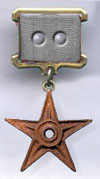| This is a Wikipedia user page. This is not an encyclopedia article or the talk page for an encyclopedia article. If you find this page on any site other than Wikipedia, you are viewing a mirror site. Be aware that the page may be outdated and that the user whom this page is about may have no personal affiliation with any site other than Wikipedia. The original page is located at https://en.wikipedia.org/wiki/User:Evensteven. |

|
Born American, raised Episcopalian, settled in Christian Orthodoxy.
I'm getting to know the Answer to life, the universe, and everything: Jesus, the Christ, the Son of the Living God. But that's because He knew me first. As for answers, I have a start on a few; there never is any real conclusion to that process in this life. So I like a really good question better: opening up lines of inquiry, exploration, vistas, giving life room to search and grow. Best of all are the ultimate questions, the ones where answers aren't the real goal, where the only answer is to live in a quest, and the quest is the answer, where one seeks in order to find, only to find what it is even better to seek. Which is the point where one needs to refer back to the Answer and cycle again.
I like looking outside the box, and dislike lack of vision and legalism. I value courtesy highly and therefore disdain political correctness, which seeks only to legislate courtesy, while both courtesy and correctness come only from the heart. I am Orthodox, not orthodox, not conventional, not conservative, not afraid of change, not afraid of tradition, not status quo, not dedicated to innovation for its own sake. The new sometimes (not always) deserves a chance to prove itself, but does not do so until stress-tested, and may also deserve to die. The old sometimes (not always) deserves a chance to remain rooted in place, and to grow, but sometimes suffers from rot. Where there's a garden, there is cultivation, and there are weeds. It takes a Gardener to know the difference, and to wield the hoe.
I think Wikipedia was a fine idea, built to thrive on good will and freedom (together, inseparably). Today, I find it damaged by editors who refuse to put its high ideals, particularly civility, into practice. Those who do not expect to learn anything from editing cannot be expected to have anything constructive to contribute. They also drive away countless others who are constructive, as they have been doing for years. It is a great shame.
Short essay on science and Christianity
|
|---|
|
"It is wrong to think that the task of physics is to find out how nature is. Physics concerns what we can say about nature. -- Neils Bohr, as quoted in Rhodes, Richard (2012) [1987], The Making of the Atomic Bomb, Simon & Schuster, p. 77, ISBN 978-1-4516-7761-4 I admire Bohr's succinct correction about attitudes to physics, and by extension, to all sciences. He was ever reticent, even unwilling, to express or promulgate "laws of nature", and resistant, even opposed to the notion that physics [science] might actually be able to arrive at absolute truths or principles. Instead, he preferred to refer to "viewpoints" or "lines of reasoning", and refused to "carry argument beyond physical evidence", placing strict limits on abstraction. He rejected the idea that physics could afford to be authoritarian, "rigidly governed by mechanistic cause and effect". Thus predisposed, he worked out (beginning in 1911 and 1912) his discoveries about the nature of the atom that led to the establishment of the theory of quantum mechanics and to his 1922 Nobel Prize (ref to Rhodes, ch 3). Even today this foundational approach to science is not widely appreciated outside the ranks of professional scientists, and not always even then. It is perhaps remarkable then that the Orthodox Christian faith reflects a parallelism of such attitude within religion. It views God Himself as the authority, the only real authority, the only absolute, these things therefore not being abstractions but characteristics of the infinite being of God, and indeed, manifestations of His action. But finite humans, unable to grasp the infinite but only to apprehend it in a limited fashion, are restricted to an experience of portions: the concrete, the practical, the example, the situation, the life of change and growth. The ultimate authority Himself is not authoritarian, nor rigid, nor abstract, nor legalistic, but relational, within Himself, and with people. Humans do not arrive at absolute truths, but the absolute God comes to be with humans. And people respond with all those qualities that humans have, viewpoints, perceptions, lines of reasoning, intuitions, and relations in community. Thus, Orthodox theology and doctrine depend first on God and what He reveals, but are not themselves the whole of Him, nor absolute. His revelation of Himself is true and does not change. But it is wrong to think that the task of Orthodox theology is to describe (much less find out) what God's nature is. Orthodox theology concerns what we can say about God. This compatibility of outlook is but one example of how science and Christianity are not fundamentally opposed to each other. Most conflicts have within their germinations a certain rigidity of posture, the assumption of mechanistic principles that can drive adherents towards the proclamation of absolutes. Neither science nor religion are free of this very human, though flawed, tendency to carry argument beyond evidence, even beyond revelation. But the tendency can also continue, carrying intuition beyond those boundaries, leading us to draw unwarranted conclusions. The remedy in science is as Bohr described, to adhere to the physical evidence (and also to pursue experiment to obtain more evidence). The remedy in Christianity is to adhere to God, in relationship and community, so that our personal perceptions do not outrun God's revelations to His Church. In both, the individual is capable of seeking out insights (new to the person, perhaps to others), but the promise of increasing wisdom first means much work, then communication, and also confirmation within the scientific or religious community. Neils Bohr used to say "no paradox, no progress", meaning that without puzzles and contradictions we don't have pointers to the really fruitful areas for growing understanding. Similarly, Orthodox Christianity might paraphrase him in "no mystery, no life", meaning that without the holy mysteries given us by God, we don't have the means to grow in knowledge of God, the Life-giver, wherein our finite human being reaches into the infinite image of God. |
Perfect opinion piece
|
|---|
|
Points of View
|
|---|
|
Awards
| ||||||||||
|---|---|---|---|---|---|---|---|---|---|---|
Precious editEastern Christianity --Gerda Arendt (talk) 08:32, 11 January 2015 (UTC)
|






